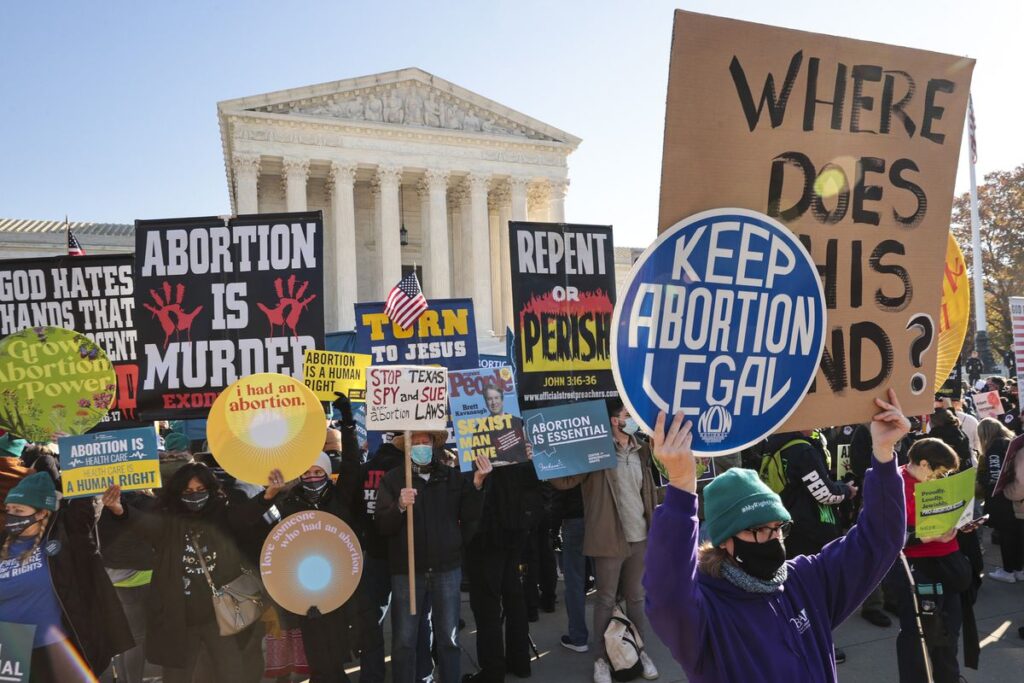In this first commentary, I will deal with the current situation. In a later commentary, I will deal with why I believe the pro-abortion advocates failed to make a compelling case logically, morally, legally and constitutionally.
Prior to the hearing of arguments on Roe v. Wade, I believed there was a better than 50/50 chance that the Supreme Court would uphold the Mississippi law that moves the ban on abortions from 24 weeks to 15 weeks. I thought there was virtually no chance that the high Court would totally reverse the 1973 decision.
Following the hearing, I am betting that the Supreme Court will uphold the Mississippi law – and that there is at least a 30 percent chance that the Court will reverse Roe v. Wade.
It is a complex case, to say the least. It is fraught with highly emotional public reactions on both sides. Pro-abortion activists are predicting a revolution in the streets. Senate Majority Leaders Chuck Schumer is already using a possible overturn of Roe v. Wade as an excuse to pack the court – a threat echoed by several congressional Democrats on the racial left.
Those who have followed my commentaries know that I am pro-life. In one of those commentaries is laid out the case explaining why abortion is not a woman’s exclusive inalienable right. It is officially a constitutional right only based on the Roe v. Wade decision – just as owning slaves was a constitutional right according to the early decisions by the Supreme Court. Those Court decisions were completely reversed because they were egregiously wrong – as was the Court’s infamous Dred Scott Decision.
The issue of stare decisis (precedent) did not prevail with slavery because the Court eventually concluded that those earlier decisions were hopelessly and egregiously flawed … wrong. That has been the basis of the current challenge.
Those defending the Mississippi law have coincidentally asked the Court to take one of two options. One is to declare the law constitutional but leave Roe v. Wade on the books. The second is to declare that Roe V. Wade was an improper intrusion into state rights AND the role of Congress.
This latter point is often overlooked. The Congress – not the Supreme Court – is in the business of enacting laws. There is no federal law banning states from banning abortions. Another example of Congress shirking its constitutional responsibility. We have seen that movie before.
In listening to the entire hearing – especially the questions and comments of the justices – I became increasing convinced that there are potentially six justices leaning to uphold the Mississippi law. What surprised me was my impression that there could be five justices in favor of overturning Roe v. Wade completely.
Justice Kavanaugh gave that latter possibility the most credence when he seemed to be saying that the Court should not even be involved in the issue. The Court should overturn Roe V. Wade and let Congress and the state legislatures deal with it.
But even if the Court just upholds the Mississippi law, the impact on abortion-on-demand will be significant. There are approximately 28 states poised to pass similar laws setting the deadline for abortion at less than 24 weeks – possibly as little as 12 weeks.
Utah has already passed an 18-week ban. That law is not being enforced while challenged in the federal courts. If the Supreme Court upholds Mississippi’s law, the legal challenge in Utah will be moot – and the law will be enforced.
As is always the case, the dialogue throughout the hearing was civilized with both sides presenting their arguments without the type of insults, accusations and exaggerations that mark the more emotional public discourse. The only comment that tiptoed to the edge of political hyperbole was when Justice Sonia Sotomayor rhetorically asked:
“Will this institution [the Supreme Court] survive the stench that this creates in the public perception that the Constitution and its reading are just political acts?”
She went on to say that overturning Roe v. Wade would literally destroy the credibility of the Court. This stems from an arrogant assumption that the case against Roe v. Wade is political and without merit in law and civic morality.
Just as a matter of process and tradition, the pro-abortion side had the advantage of two advocates and twice the time to make their case on behalf of the plaintiff, the Jackson Women’s Health Organization, Mississippi’s only abortion clinic. – one being Julie Rikelman, of the Center for Reproductive Rights, and the other being United States Solicitor General Elizabeth Prelogar, on behalf of the Biden administration. The pro-life position was advanced by Mississippi Solicitor General Scott Stewart. As a footnote, I did not think he was as good as he could have been. But I still believe he carried the day.
While the Court has now heard the arguments from both sides, it will be almost one year before we the people will have their decision. That is just how the Court works. They will be hearing case after case and then in late Spring or early Summer, they will start issuing their decisions before they go in recess until the new session – which begins the first Monday of October.
In the meantime, there is likely to be a LOT of public and political debate – even protests. All that hot air may be a major contributor to global warming, but it will all be Kabuki Theater – a lot of “sound and fury signifying nothing.” The Supreme Court will advance to its decision cloistered from the passions of the people in the streets – as it should.
In Part Two of this commentary, I will address the strengths and weaknesses of the various arguments. Stay Tuned.
So, there ‘tis.
